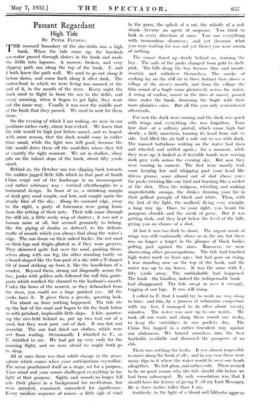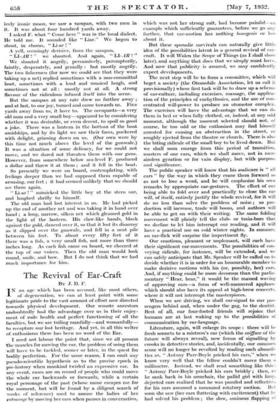Passant Regardant
High Tide
By PETER FLEMING.
Tag seaward boundary of the rice-fields was a high
bank. When the tide came up, the brackish sea-water passed through sluices in the bank and made the fields into lagoons. A narrow, broken, and very slippery path ran along the top of the bank. F. and 1 both knew the path well. We used to go out along it before dawn, and come back along it after dark. The motor-boat in which we were living 'was Moored at the end of it, in the mouth of the river. Every night the duck:tried to flight in from the sea to the fields, and every niemittg, when it began to get light, they went out the same way. Usually it was over the middle part of the bank that they passed. We used td wait for them there. -'
Oil the evening of which I am writing, we were in our positions rather early, about four o'clock.' We knew that the tide would be high just before sunset, and we hoped, with some reason, that the duck would come in earlier than usual, while the light was still good, because the tide would drive them off the mud-flats where they fed at exaCtlythe right moment. We sat in shallow, slimy pitS on the inland- slope of the bank, about fifty yards apart.
Behirid us, the October sun was slipping back towards the sudden jagged little hills which in that part of South China erupt out of the landscape in an inconsequent and rather arbitrary way : vertical afterthoughts to a horizontal design. In frOnt of us, IL shrinking margin of dark grey mud caught, and lost, and caught again the steady blue of the sky. Along its seaward edge, away to the right, a party of fishermen were going home from the setting of their nets. Their talk came through the still air, a little reedy wisp of chatter ; it was not. a human noise at all, but seemed genuinely to belong, like the piping of dunlin or dotterel, to the delicate traffic of sounds which you always find along the water's edge. The sun shone on their naked backs; the wet mud on their legs and thighs glinted as if they wore greaves. They skimmed quite fast over the mud, pushing them- selves along with one leg, the other standing tautly on a board shaped like the fore-part of a ski, with a T-shaped hit of wood striking up from it, like the handlebars of a scooter. Beyond them, strung out diagonally across the bay, junks with golden sails followed the tall thin guide- posts which marked the channel to the harbour's mouth. 17nder the bows of the nearest, as they debouched front the river, you could see a huge painted eye. All the junks have it. It gives than a greedy, questing look.
For about an hour nothing happened. The tide ate sip the laSt of the mud and began to hit the bank below ns with petulant, implacable little slaps. A kite, quarter- ing the rice-field behind us, put up two teal out of a pool, but they went past out of shot. It was hot and peaceful. The sun had dried our clothes, which were wet from wading. Occasionally I whistled to F., or F. whistled to me. We had got up very early for the morning flight, and we were afraid we might both go to sleep.
All at once there was that subtle change in the atmo- sphere..which comes when your anticipations crystallize. The scene proclaimed itself as a stage, set for a purpose, Your mind and your senses challenged everything in the li�fit' of "that purpose. Sights and sounds no longer fell
into places in a background for meditation, but were arrested,,. examined, ransacked for significance.. Every random 'sequence of -noisesa little sigh of wind
in the grass, the splash of a rat, the whistle of a red. shank—beeame an agent of suspense. You tried to look in every direction at once. You saw everything with tremendous clearness ; and yet (because what you were waiting for was not yet there) you were aware of nothing.
The sunset flared up slowly behind us, staining the bay. The sails of the junks changed from gold to shell- pink. The hills along the bay became blue and unsub- stantial, and withdrew themselves. The smoke of cooking lay on the still air in three distinct tiers above a village at the river's mouth, and front the village the thin sound of a bugle came plaintively across the water. A string of curlew, russet in the fires of sunset, passed close under the bank, drowning the bugle with their snore plaintive cries. But all this you only remembered afterwards.
For now the duck were coming and the dusk wits quick with wings and everything else wits forgotten. Your first shot—at a solitary pintail, which came high but slowly, a little uncertain, turning its head from side to side—had filled the air half a mile out. to sea with 'duck. The massed battalions waiting on the water had risen and wheeled and settled again ; for a moment, while they were up, it looked as if invisible hands were waving dark grey veils across the evening sky. But now they were coming in earnest. The first were mostly teal; souse keeping low and whipping past your head like driven grouse, some almost out of shot above you : the packs twisting like one bird and bursting like a rocket at the shot. Then the widgeon, whistling and making unpredictable swoops, the drakes drawing your lire in their gallant panoply of black and white. Then, with the last of the light, the mallard, flying very straight, a long way up. Once, to your right, you heard the pompous chuckle and the creak of geese. But it was getting dark, and they kept below the level of the hills; giving you ito chance of a shot.
At last it was too dark to shoot. The urgent music of wings was still continually above its its the air, but. there was no longer it target in the glimpse of black bodies pelting past against the stars. Moreover, we were discovering other preoccupations. The tide had touched high water mark an hour ago ; but had gone on rising. I was standing now 011 the top of the batik, 1111.1 the water was up to my knees.. It was the seine with F., fifty yards away. The unthinkable had luippemsl. The bank—the familiar, indeed the indispensahh• bank- had disappeared. The tide swept in over it strongly, tugging at our legs. It was still rising.
I called to F. that I would try to work my way along to him; and this, by at process of submarine conjecture with my feet, I managed to do after about: twenty minutes. The water was now up to our waists. We took off our coats 111111 slung them round our necks,
to keep the eartriilges in our pockets dry. The China Sea lapped in a rather truculent way against our abdomens. We braced ourselves into the best footholds available and discussed the prospects of au ebb.
There was nothing else to do. IL was almost impossible to move along the bank at all ; and in any ease there were many dips in it where the water would be over our heads altogether. We felt glum, and rat her cold. There seemed to be no good reason why the I id, should ebb before we had been submerged. My only consolation was that I should have the luxury of giving F. all my Last Messages. Ik is three inches taller than I am.
Suddenly, in the light of a bland and hitherto aggress-
ively ironic moon, we saw a sampan, with two men in it. It was about four hundred yards away.
I asked F. what " Come here'' was in the local dialect. He told me. It sounded like " Liar." We began to stout, in chorus, " Li-ar !
A yell, seemingly derisive, from the sampan.
" LI-AR ! " we shouted. And again, " LI-AR ! "
We shouted it angrily, persuasively, peremptorily, faintly, desperately, and genially : but mostly angrily. The two fishermen (for now we could see that they were taking up a net) replied sometimes with a non-committal hoot, sometimes with a loud and musical laugh, and sometimes not at all : mostly not at all. A strong savour of the ridiculous infused itself into the scene.
But the sampan at any rate drew no further away ; and at last, to our joy, turned and came towards us. Five yards away from us, it hove to. The occupants—a very old man and a very small boy—appeared to be considering whether it was desirable, or even decent, to spoil so good a joke. There was a lantern in the bottom of the boat amidships, and by its light we saw their faces, puckered with delight, grinning down on us. (Our own were by this time not much above the level of the gunwale.) It was a situation of some delicacy, for we could not move, and we dared not threaten them with our guns. However, from somewhere below sea-level F. produced a dollar and threw it at them ; and it fell in the boat.
So presently we were on board, contemplating, with feelings deeper than we had supposed them capable of arousing, our feet ; it had seemed unlikely that we should see them again.
" Li-ar ! " mimicked the little boy at the stern oar, and laughed shrilly to himself.
The old man had lost interest in us. He had picked up the end of another net and was taking it in hand over hand ; a long, narrow, silken net which gleamed gold in the light of the lantern. His claw-like hands, black against the gold, danced over it, so that it lost its disarray as it slipped over the gunwale, and fell in a neat pile between his feet. To about every fifty feet of it there was a fish, a very small fish, not more than three inches long. As each fish came on board, we cheered at the top of our voices. Then the old man would look round, smile, and bow. But I do not think that we had much importance for him.







































 Previous page
Previous page